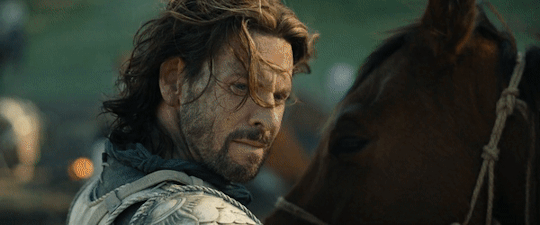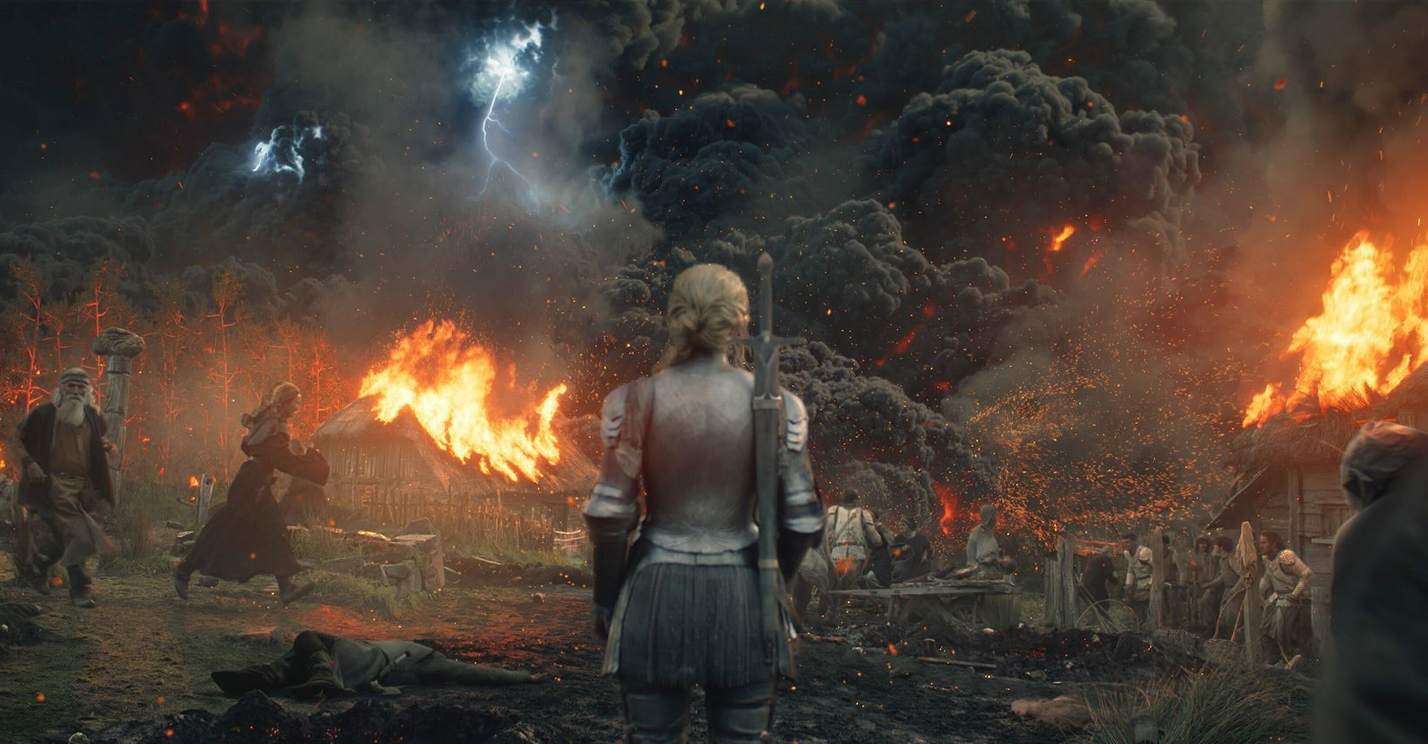Episode 7: “The Eye”
Our most likeable grouping is the triad of Durin IV, his princess Disa, and the half elf, Elron. These are the three with lives that allow for time that includes long development of friendship, marriage and perspective. These three share highly developed sense of play, humor and appreciation of good things.
The Harfoots returned, in their most interesting and arresting appearance so far in the series. Their scenes include the Big Stranger and the Weirdlings trio. The Big Stranger does magical good, before Sadoc sends him off with a star map to where other Big People are who may help him, while the Weirdlings seem to do evil. Nori, Poppy, their mother and Sadoc soon decide to follow the Big Stranger and help him, because that is what Harfoots do – they help each other out and don’t leave each other alone. This is where I went, “So what happened to that business of leaving carts of Harfoots of those who can't keep up with the main group on the wandering trail, emphasized in previous episodes?” However, thanks to Harfoots, we’re pretty sure we’ll be seeing ents, if not this season, in some later season, as Sadoc tells us that “trees can talk, at least some of them do.” In the first episode we saw an ent silouhetted on the distant horizon, when the Big Stranger’s transport from wherever hit Middle Earth in an arc of fire. I, for one, am hoping we shall finally see entwives, at some point.
Two characters who are believed dead, Celeborn and Isildur, we know from LotR are not dead. Their fates in the series won’t be revealed probably for some years? Happily, we learn Isildur’s bonded horse, Berek, survived and refused to board the ship back to Númenor.
Set free by Elendil, Berek gloriously gallops across the plain, tail flagged, nostrils wide, on the trail presumably of his rider. One guesses that Elendil guesses Berek knows his bonded rider isn't dead.
Though his father, Durin III, disinherits Durin IV, we also know that it can’t be that long before mithril is mined, since there are weapons and armor made from it that remain in possession of elves in LotR’s Third Age’s ending. Though it ends in horror of the balrog some scenes later, the cavern into which the Tree sent its vast root system that had transformed at the end of the First Age into the magical mithril, was a sight worth seeing.
Galadriel shows compassion, as well as some progress into what will become her notable wisdom and long view with young adult Theo, the youngster who cannot find his mother, whose entire life and all he knows destroyed, who feels a weight of guilt, believing the catastrophe of the volcano and tsunami of orcs that overwhelm the Southlands is his fault, that he caused it by giving that sword hilt-key to Weglef. She comforts Theo, she assures him that it isn’t his fault – as later, blind Queen Míriel assures Galadriel the catastrophe is not her fault either. Galadriel protects him, declares him a soldier, and ultimately tets him reunited with his mother Bronwyn, and now, his surrogate father, the sylvan elf, Arondir. However, we also wonder, is it wise of her to be taking the Halbrand, the newly recognized king of the Southlands, which essentially, no longer exist, to Linden so the elves can heal his wounds? Perhaps we shall find out in the next, the final episode of the first season of Rings of Power. But in this episode the last thing we see is Adar staring east to Mount Doom, and declaring the charred, ash fogged Southlands, now safe from the Sun's light, the homeland of his orcs.
~~~~~~~~~~~~~~~~~
Unlike the RoP figures, since we have read LotR and possess hindsight, we know the terrible things that occur at end the Second Age of Middle Earth in Lord of the Rings via tales, song, poetry, memories and legendarium. We never learned of any of it through the memories and accounts of those who were there and who participated in them. In Rings of Power we are receiving this past via those who were there, who suffered and died, who were the remembered heroes of the Light, and we see as they see, the recalled traitors and perpetrators of the Dark. Seeing the initiation of the horrors of the Second Age played out for our eyes, seeing the seeds of horrors, that may need not have happened, planted throughout this, as well as the previous episodes, adds dimensions to our responses that we couldn’t have only reading of them at the conclusion of Middle Earth’s Third Age, via the memories and descriptions long after, by a few who were there, and those who were not present in the Second Age.
It is important for the story and arcs Rings of Power are showing and telling us, that we be reminded that what we recall from a telescoped portrait view, is now given to us in landscape video – and it often differs in significant ways, while providing compelling stories and characters that we can’t have known from our previous understanding. That understanding came to us enclosed within the halo of heroic history. Here we witness the events and characters without the nimbus of memory’s glory, including characters' moral doubts, inter and intra rivalries, dislike and conflicts. As we know, even well documented, well researched history, leaves out a great deal, often deliberately left out, often revealed long after the canon histories are written.
It seems from the slagging outcry of many, just as with the more recently unearthed stories and events of, say, slavery, Jim Crow and the Civil Rights era, many do not wish the tarnish be brought into the poetry and histories, as well as glow on those halos and nimbi. This disinclination applies at least equally to the language in which ROP is told on screen presently. Though it mirrors that of the language employed by Tolkien in LotR, it is shouted out as ‘bad writing’. One can’t help but speculate these have either never read LotR, or merely are determined to destroy the progress of RoP for reasons hidden deep within their own hearts. Others though, probably really don’t like this progenitor of heroic fantasy and its legacies, honestly cannot relate to its virtues, which dislike on its own, is perfectly legitimate.
On the other hand, no matter how brilliant these sequel, prequels and adaptations of the originals of the progenitors of the genres might be, they can never bring us the same sense of wonder and discovery. We have acquired masses of experience and knowledge of literature, language, history, and sheer living experience that nothing can now break through to provide the same experiences of when we were young. But sometimes, they can provide a respectable simulacrum. For me, since Rings of Power is its own, if smaller thing, it comes the closest to the reading experience of LotR in those earlier years, a close resemblance, the memory of what it was like reading the LotR the first 20 + times! However, I, for one, generally disliked Peter Jackson's adaptation, and dislike it more as time goes one, while many who hate Rings of Power have only seen PJ's trilogy and never read the books -- as too long and boring. There are the others though, who have the appendices and Silmarillion memorized; they loathe this series.
Then there are the racists who are concertedly campaigning to kill the series dead because a Black Puerto Rican is cast as an elf, and an Anglo African is a Harfoot. They reveal themselves as residents of Mordor and worshippers of Sauron with every comment they make. There are so many reasons to feel that in genre fans, whether for print, television, film, gaming, awards, have been overtaken by a significantly large contingent of fascists.
Despite FanFascism, and Point-to-Point Replicant\ Demanders, there are watchers who do like Rings of Power’s fractal changes from the original LotR’s Third Age perspectives of the Second Age. Some even find it more interesting, while it remains much the ‘feel’ of Tolkien, that it is at home within These Times in which we are viewing this legendary universe. For instance, this sort of viewer enjoys the non-canon, original characters most, figures as sylvan elf Arondir (who does his own stunts) and Dwarf Princess, Disa.
~~~~~~~~~~~~~~
"Fiona Apple Drops New Song, ‘Where the Shadows Lie,’ From ‘Lord of the Rings: The Rings of Power"
Deadlines After Show for "The Eye", Episode 7, here.
An essay in New York Magazine as to why, whether we enjoy them or not, these prequels are always going to be inferior experiences to our experiences with the originals: "The Fantasy Prequel Problem" by Kathryn VanArendonk.




No comments:
Post a Comment